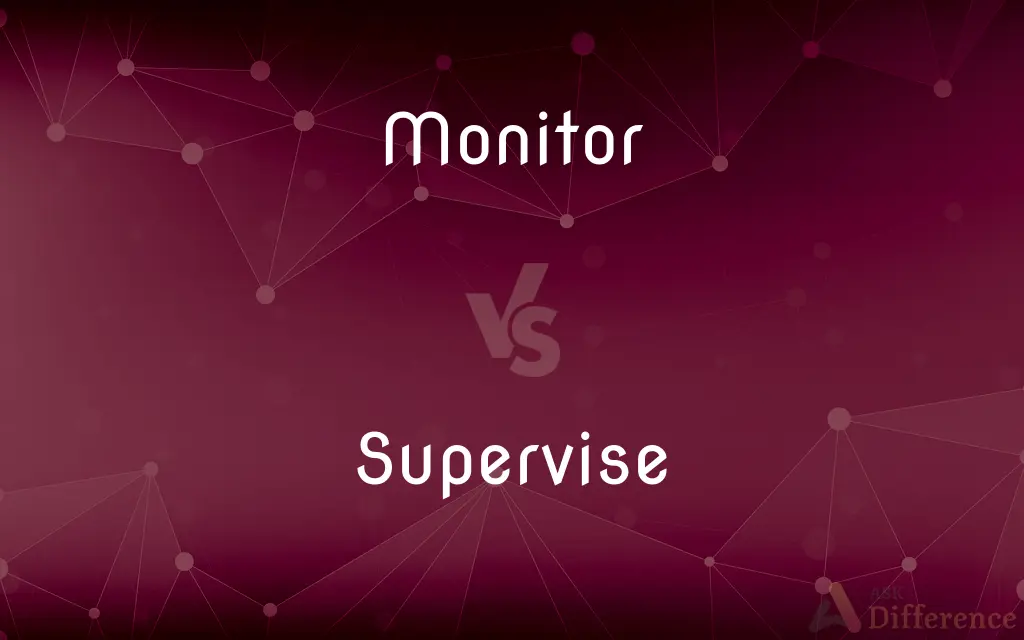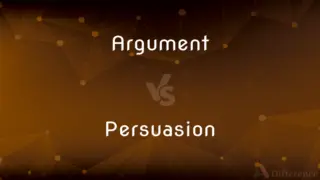Monitor vs. Supervise — What's the Difference?
Edited by Tayyaba Rehman — By Urooj Arif — Updated on March 26, 2024
Monitoring involves periodic or continuous observation to check the progress of something, while supervision encompasses direct oversight and guidance to ensure tasks are completed effectively.

Difference Between Monitor and Supervise
Table of Contents
ADVERTISEMENT
Key Differences
Monitoring is primarily about observing or checking something over a period of time to ensure it's on track or to gather information. This can be done through various means such as software, systems, or by individuals, and it's often used to track the progress or quality of a task or process. For example, in a workplace, monitoring might involve reviewing performance metrics or system outputs to assess productivity or identify issues. Supervision, on the other hand, involves a more hands-on approach. It's about overseeing a task, project, or people to ensure everything goes according to plan. This includes providing guidance, instruction, and feedback to those being supervised. Supervisors are typically responsible for the performance of their team or the outcomes of the tasks they oversee. They play a direct role in decision-making and problem-solving.
While monitoring can be somewhat detached and focuses on observation, supervision is interactive and involves engagement with the process or people being supervised. Monitoring might alert you to a problem, but supervision involves stepping in to correct it.
In some contexts, monitoring is a part of supervision, but not all monitoring is supervisory in nature. For instance, a software system might monitor network traffic for anomalies as a security measure, which doesn't involve supervision. However, a project manager supervising a team will monitor their progress as part of their supervisory duties.
The tools and methods used in monitoring and supervision also differ. Monitoring might employ software, sensors, or automated systems to gather data, while supervision is more about personal interaction, leadership, and management skills.
Comparison Chart
Definition
Observing or checking the progress of something periodically or continuously.
Overseeing and directing tasks or people to ensure objectives are met.
ADVERTISEMENT
Focus
On tracking and gathering information.
On guidance, instruction, and feedback.
Engagement
Can be passive or indirect.
Involves direct interaction and involvement.
Tools Used
Often uses software, sensors, or automated systems.
Relies on personal leadership and management skills.
Contexts
Common in data analysis, quality control, and security.
Prevalent in leadership, project management, and education.
Compare with Definitions
Monitor
Tracking system performance.
IT professionals monitor network traffic to prevent unauthorized access.
Supervise
Guiding a team towards goals.
The supervisor ensures the project meets its deadlines and quality standards.
Monitor
Checking patient health indicators.
Nurses monitor vital signs to assess patient well-being.
Supervise
Overseeing student activities.
Teachers supervise the playground during recess to maintain safety.
Monitor
Reviewing progress on a project.
Managers monitor project milestones to ensure timelines are met.
Supervise
Directing construction work.
The foreman supervises workers to comply with building codes.
Monitor
Observing wildlife in their habitat.
Scientists monitor bird populations to study their migration patterns.
Supervise
Managing restaurant operations.
The head chef supervises the kitchen staff to ensure dish quality.
Monitor
Surveillance for security purposes.
Security personnel monitor CCTV footage to ensure safety.
Supervise
Coaching a sports team.
Coaches supervise training sessions to improve team performance.
Monitor
One that admonishes, cautions, or reminds, especially with respect to matters of conduct.
Supervise
Observe and direct the execution of (a task or activity)
The sergeant left to supervise the loading of the lorries
Monitor
A pupil who assists a teacher in routine duties.
Supervise
To manage and direct; be in charge of
Supervises twenty employees.
Supervised the construction of the new kitchen.
Monitor
A usually electronic device used to record, regulate, or control a process or system.
Supervise
(transitive) To oversee or direct a task or organization.
Without someone to supervise them, the group will lack direction.
Monitor
A video display or speaker used in a production studio to check audio or video quality
The sound engineer detected a hiss on the monitor.
Supervise
To look over so as to read; to peruse.
Monitor
(Computers)A device that accepts video signals from a computer and displays information on a screen; a video display.
Supervise
To oversee for direction; to superintend; to inspect with authority; as, to supervise the construction of a steam engine, or the printing of a book.
Monitor
(Computers)A program that observes, supervises, or controls the activities of other programs.
Supervise
To look over so as to read; to peruse.
Monitor
An articulated device holding a rotating nozzle with which a jet of water is regulated, used in mining and firefighting.
Supervise
Supervision; inspection.
Monitor
A heavily ironclad warship of the 19th century with a low, flat deck and one or more gun turrets.
Supervise
Watch and direct;
Who is overseeing this project?
Monitor
A modern warship designed for coastal bombardment.
Supervise
Keep tabs on; keep an eye on; keep under surveillance
Monitor
See monitor lizard.
Monitor
To check the quality or content of (an electronic audio or visual signal) by means of a receiver.
Monitor
To check by means of an electronic receiver for significant content, such as military, political, or illegal activity
Monitor a suspected criminal's phone conversations.
Monitor
To keep track of systematically with a view to collecting information
Monitor the bear population of a national park.
Monitored the political views of the people.
Monitor
To test or sample, especially on a regular or ongoing basis
Monitored the city's drinking water for impurities.
Monitor
To keep close watch over; supervise
Monitor an examination.
Monitor
To direct.
Monitor
To act as a monitor.
Monitor
Someone who watches over something; a person in charge of something or someone.
The camp monitors look after the children during the night, when the teachers are asleep.
Monitor
A device that detects and informs on the presence, quantity, etc., of something.
Monitor
(computing) A device similar to a television set used as to give a graphical display of the output from a computer.
The information flashed up on the monitor.
Monitor
A studio monitor or loudspeaker.
Monitor
(computing) A program for viewing and editing.
A machine code monitor
Monitor
A student leader in a class.
Monitor
(nautical) One of a class of relatively small armored warships with only one or two turrets (but often carrying unusually large guns for a warship of its size), usually designed for shore bombardment or riverine warfare rather than open-ocean combat. from 1862
Monitor
(archaic) An ironclad.
Monitor
A monitor lizard.
Monitor
(obsolete) One who admonishes; one who warns of faults, informs of duty, or gives advice and instruction by way of reproof or caution.
Monitor
(engineering) A tool holder, as for a lathe, shaped like a low turret, and capable of being revolved on a vertical pivot so as to bring the several tools successively into position.
Monitor
A monitor nozzle.
Monitor
(transitive) To watch over; to guard.
Monitor
One who admonishes; one who warns of faults, informs of duty, or gives advice and instruction by way of reproof or caution.
You need not be a monitor to the king.
Monitor
Hence, specifically, a pupil selected to look to the school in the absence of the instructor, to notice the absence or faults of the scholars, or to instruct a division or class.
Monitor
Any large Old World lizard of the genus Varanus; esp., the Egyptian species (Varanus Niloticus), which is useful because it devours the eggs and young of the crocodile. It is sometimes five or six feet long.
Monitor
An ironclad war vessel, very low in the water, and having one or more heavily-armored revolving turrets, carrying heavy guns.
Monitor
A tool holder, as for a lathe, shaped like a low turret, and capable of being revolved on a vertical pivot so as to bring successively the several tools in holds into proper position for cutting.
Monitor
A monitor nozzle.
Monitor
Display consisting of a device that takes signals from a computer and displays them on a CRT screen
Monitor
Someone who supervises (an examination)
Monitor
Someone who gives a warning so that a mistake can be avoided
Monitor
An iron-clad vessel built by Federal forces to do battle with the Merrimac
Monitor
Electronic equipment that is used to check the quality or content of electronic transmissions
Monitor
A piece of electronic equipment that keeps track of the operation of a system continuously and warns of trouble
Monitor
Any of various large tropical carnivorous lizards of Africa and Asia and Australia; fabled to warn of crocodiles
Monitor
Keep tabs on; keep an eye on; keep under surveillance
Common Curiosities
How do tools for monitoring and supervision differ?
Monitoring tools often include software and automated systems for tracking and gathering data, while supervision relies more on personal interaction and management skills.
What does it mean to monitor something?
Monitoring refers to the process of observing or checking something regularly to ensure it's progressing as expected or to gather information.
Can monitoring be done without supervision?
Yes, monitoring can be done independently of supervision, especially when it involves automated systems or when the purpose is solely to gather data.
What roles typically involve supervision?
Roles involving supervision include managers, teachers, coaches, supervisors, and any position that involves leading or managing others.
Is supervision always necessary?
Supervision is necessary in contexts where guidance, instruction, and oversight are critical to achieving desired outcomes, especially when managing people or complex projects.
What skills are important for effective supervision?
Effective supervision requires leadership, communication, decision-making, problem-solving, and team management skills.
How does supervision differ from monitoring?
Supervision involves direct oversight and guidance, often including decision-making and problem-solving, whereas monitoring is focused on observation and tracking.
How important is monitoring in project management?
Monitoring is crucial in project management as it helps in tracking progress, identifying potential issues early, and ensuring project objectives are met.
Can a supervisor also be a monitor?
Yes, a supervisor often monitors as part of their role to ensure they are aware of progress and issues, enabling them to provide effective guidance.
How do monitoring and supervision impact team performance?
Both monitoring and supervision are vital for team performance; monitoring ensures tasks are on track, while supervision provides the direction and support needed to achieve objectives.
Share Your Discovery

Previous Comparison
Argument vs. Persuasion
Next Comparison
Slide vs. SwipeAuthor Spotlight
Written by
Urooj ArifUrooj is a skilled content writer at Ask Difference, known for her exceptional ability to simplify complex topics into engaging and informative content. With a passion for research and a flair for clear, concise writing, she consistently delivers articles that resonate with our diverse audience.
Edited by
Tayyaba RehmanTayyaba Rehman is a distinguished writer, currently serving as a primary contributor to askdifference.com. As a researcher in semantics and etymology, Tayyaba's passion for the complexity of languages and their distinctions has found a perfect home on the platform. Tayyaba delves into the intricacies of language, distinguishing between commonly confused words and phrases, thereby providing clarity for readers worldwide.















































